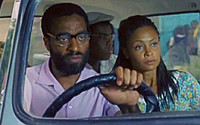
prd Andrea Calderwood
with Thandie Newton, Chiwetel Ejiofor, Anika Noni Rose, Joseph Mawle, John Boyega, Onyeka Onwenu, Genevieve Nnaji, Hakeem Kae-Kazim, Susan Wokoma, Babou Ceesay, Jude Orhorha, Gloria Young
release UK 11.Apr.14, US Jul.14
13/Nigeria 1h51

On the run again: Ejiofor, Boyega and Newton



TORONTO FILM FEST

 This informative drama recounts the tumultuous decade following Nigeria's independence with strong characters and a strikingly visual production. On the other hand, the script feels fragmented, including random scenes that are probably important in Chimanda Ngozi Adichie's novel but lack context on-screen.
This informative drama recounts the tumultuous decade following Nigeria's independence with strong characters and a strikingly visual production. On the other hand, the script feels fragmented, including random scenes that are probably important in Chimanda Ngozi Adichie's novel but lack context on-screen.
Following independence in 1960 Lagos, foreign-educated Olanna (Newton) refuses a job in the new government to continue work as a university professor while her equally qualified twin sister Kainene (Rose) manages their father's business. Kainene courts controversy by falling for married Englishman Richard (Mawle), while Olanna has a different set of issues with her boyfriend Odenigbo (Ejiofor), whose Mama (Onwenu) doesn't like him seeing a Westernised woman, calling her a witch. Neither of their relationships develop smoothly, and both are caught up in the violence of their country's birth.
Using actual newsreel clips to punctuate the story, filmmaker Bandele recreates the 1960s on a remarkable scale in the larger historically based set-pieces, the bustle of Nigerian culture and the elegance and style of the upper-class characters. The script's key conflict is in the sharp contrast between local customs and those who have been educated abroad, which generates a growing sense of menace that leads to coups, grisly ethnic attacks and a terrible civil war.
Newton and Ejiofor are terrific as intelligent lovers struggling against a society that seems determined to kill everyone around them. The rocky path of their relationship is the best thing about the film, even if it's sometimes played as soapy melodrama. Rose is especially sparky in Kainene's side story, while Mawle gives a textured performance as the man caught in the middle. Meanwhile, Boyega adds a sensitive, observant presence as Odenigbo's house-boy, whose personal journey is perhaps the movie's most involving element.
Filmmaker Bandele makes the novice mistake of apparently attempting to include every scene and theme from an acclaimed novel. But a movie needs much stronger focus to engage an audience, rather than skimming along the surface. This means that the skilfully staged scenes of violence are horrific because of what's happening, but with little emotional impact they begin to feel repetitive. And as political atrocities engulf the characters, the people become strangely unsympathetic. Which leaves the historical account feeling academic rather than personal.
 |
themes, violence, sexuality | 9.Apr.14 |

 Still waiting for your comments ... don't be shy.
Still waiting for your comments ... don't be shy.
HOME | REVIEWS | NEWS | FESTIVAL | AWARDS | Q&A | ABOUT | TALKBACK